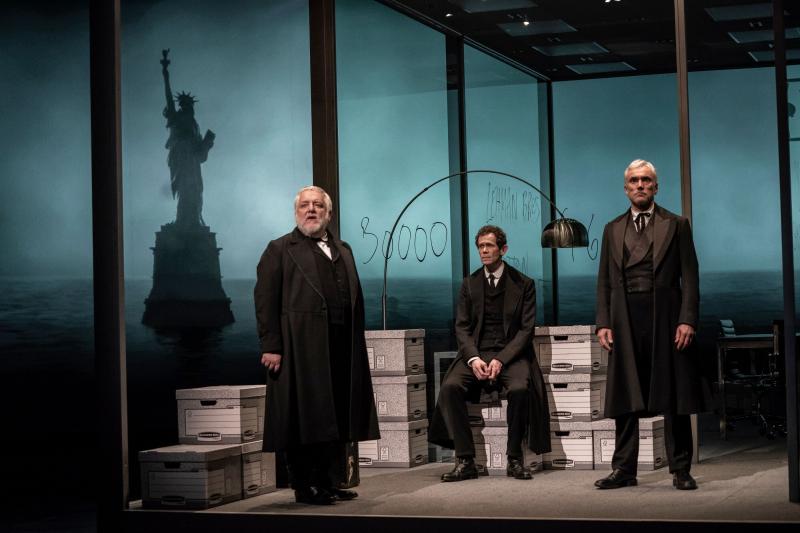Review: American Dreams Twist Into Capitalist Nightmares in Stefano Massini's Captivating THE LEHMAN TRILOGY
Like a sad, lonely island, depleted of its bounty, a single floor of the offices of Lehman Brothers is revealed, isolated, lofted above the endless business of a bustling Manhattan. It is empty, save for the boxes of files stacked on top of each other after declaring bankruptcy in 2008 and the memory of three brothers who founded the company 158 years earlier and their descendants who kept it thriving as a global investment bank.

(Photo: Stephanie Berger)
Capable of rotating to vary the audience's view, this horizontal slice of a skyscraper, designed by Es Devlin, is, save for a fleeting moment, the sole playing space for an ensemble of three actors, as it sits before a curved wall that stretches the length of the Park Avenue Armory's massive stage to display the location-defining landscapes depicted by designer Luke Halls' video projections.
The visual helps define director Sam Mendes' exquisite production of Ben Power's adaptation of Stefano Massini's captivating play, THE LEHMAN TRILOGY, as a romanticized view of the rags to riches American dream that focuses the epic drama of the company's history into an intimate family portrait.
Originally written in Italian, Massini's play premiered as a radio drama in 2012 and was translated into French for its stage debut at the Comédie de Saint-Étienne. It's been seen throughout Europe in 11 different translations. Mendes' production of Power's English version, trimmed down to three and a half hours (including two intermissions) from Massini's five-hour length, comes to New York via London's Royal National Theatre with its stellar original cast.
Accompanied by the opening melody of sound designer Nick Powell's emotion-enhancing piano score, played live by Candida Caldicot, the extraordinary Simon Russell Beale begins the story alone on stage. He is Henry Lehman, the first of the Bavarian-born Jewish brothers to make his way to America.
Like so many immigrants in 1844, Henry arrives through the port of New York City, but his career as an American businessman begins in Montgomery, Alabama as proprietor of Henry Lehman, Fabrics and Suits.
He is "the head"; the thinker. Middle brother Emanuel (Ben Miles), who arrives next, is "the arm"; the doer. They send for youngest brother Mayer (Adam Gomley) because, "He's what's needed between them. So the arm doesn't crush the head and the head doesn't humiliate the arm."
A fire that destroys the community's cotton crops puts them in the business of selling seed, the first of the many expansions and changes the company experiences before the fellows move to New York to take their chances in the finance game of Wall Street.

The play is written in third person narration, with the three brothers telling the story more than experiencing it. Though the actors remain as Henry, Emanuel and Mayer throughout the play, the gentlemen take on the roles of dozens of other characters, taking the story to that fateful day in 2008.
As this is a family drama, the action primarily covers the family's assimilation into their new country, as old customs and ideas fade with each new generation. A contemporary viewer will recognize the Lehmans as profiting off of slave labor and the carnage of war, but, as explained by Emanuel's son, aggressive capitalist Philip Lehman, their success grows as they think less of being in the business of investing in the growth of companies making products (and in the people who make those companies succeed) and more as being in the business of making money.
"Regular people use money to only to buy things. But we, who have a bank, we use money to make more money."
The brilliance of The Lehman Trilogy lies somewhere in the telling of how the aggressive tactics that can fuel the romance of a rags to riches American dream story can also twist the tale into a nightmare.
Reader Reviews



